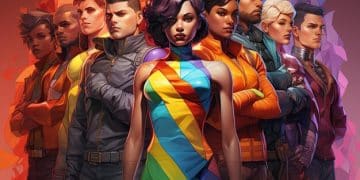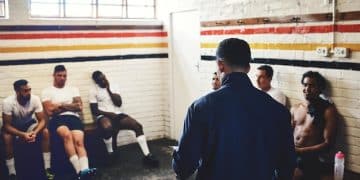The Impact of Anti-LGBT Legislation on Esports Participation in the US
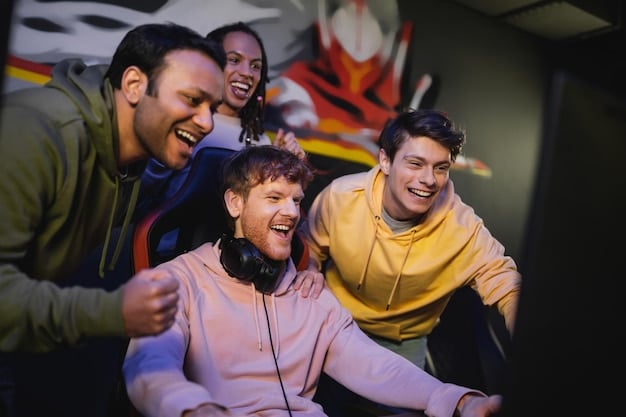
The impact of anti-LGBT legislation on esports participation in the US: What players need to know addresses the chilling effect of discriminatory laws on LGBTQ+ individuals’ involvement in competitive gaming. These laws create barriers, foster hostile environments, and threaten the inclusivity that the esports community strives for.
The world of esports has always prided itself on being a diverse and inclusive space where skill trumps all. However, the rise of anti-LGBT legislation in the US casts a shadow over this ideal. The impact of anti-LGBT legislation on esports participation in the US: What players need to know is becoming increasingly relevant as these laws threaten the very fabric of the community.
This article aims to explore the tangible effects of these legislative actions on LGBTQ+ players, teams, and events, ensuring everyone understands the stakes and how to navigate this complex landscape.
Understanding Anti-LGBT Legislation and Its Scope
To fully grasp the impact of anti-LGBT legislation on esports participation in the US: What players need to know, it’s crucial to first understand the types of laws being enacted and their potential consequences. These laws vary widely by state, targeting different aspects of LGBTQ+ life.
From restrictions on transgender athletes’ participation in sports to broader “religious freedom” laws that allow discrimination based on sexual orientation and gender identity, the landscape is complex and constantly evolving.
Types of Anti-LGBT Legislation
These laws can be categorized into several key areas:
- Sports Bans: Laws that prevent transgender athletes from participating in sports consistent with their gender identity. This directly affects transgender esports players.
- Bathroom Bills: Legislation that restricts access to public restrooms based on assigned sex at birth, creating uncomfortable and unsafe environments for transgender and gender non-conforming individuals.
- Religious Freedom Laws: Laws that allow businesses and individuals to discriminate against LGBTQ+ people based on religious beliefs.
- Curriculum Restrictions: Laws that limit or prohibit discussion of LGBTQ+ topics in schools, impacting young LGBTQ+ individuals’ sense of belonging and acceptance.
Understanding the specifics of these laws is the first step in assessing their potential impact on esports.
In conclusion, a thorough understanding of anti-LGBT legislation is essential to realizing the impact of anti-LGBT legislation on esports participation in the US: What players need to know. The laws are diverse and evolving, and they are a threat to the inclusion in esports.
The Direct Impact on LGBTQ+ Esports Players
The impact of anti-LGBT legislation on esports participation in the US: What players need to know is perhaps most acutely felt by LGBTQ+ players themselves. These laws create an environment of fear and uncertainty, making it more difficult for them to participate fully and openly in the community.
Many players may feel compelled to hide their identities, fearing discrimination or harassment. This can lead to increased stress, anxiety, and a diminished sense of belonging.
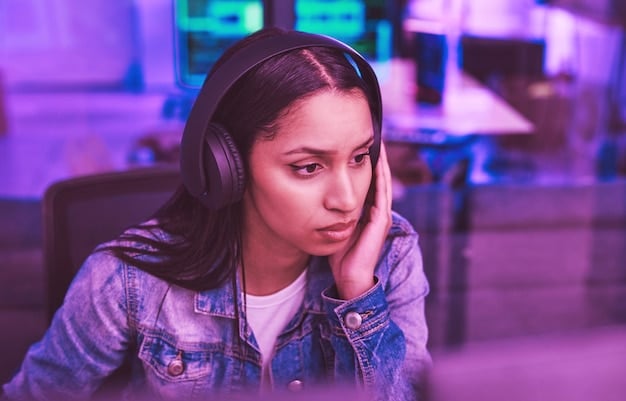
Mental and Emotional Toll
The psychological impact of these laws cannot be overstated. LGBTQ+ players may experience:
- Increased anxiety and stress related to potential discrimination and harassment.
- Feelings of isolation and alienation from the broader esports community.
- Fear of traveling to certain states for tournaments and events.
These factors can negatively affect their performance, enjoyment of the game, and overall well-being.
In addition, the impact of The impact of anti-LGBT legislation on esports participation in the US: What players need to know also causes LGBTQ+ players to consider avoiding participation in states known for anti-LGBT laws.
How Legislation Affects Esports Events and Tournaments
Esports events and tournaments are often held in different states across the US. The impact of anti-LGBT legislation on esports participation in the US: What players need to know is significant, because these events can be directly affected by these laws, creating logistical and ethical challenges for organizers.
Organizers must consider whether hosting events in states with anti-LGBT laws could create unsafe or unwelcoming environments for LGBTQ+ players and attendees.
Challenges for Event Organizers
Event organizers face several challenges:
- Choosing suitable locations that align with their values of inclusivity and diversity.
- Ensuring the safety and well-being of all participants, especially LGBTQ+ individuals.
- Navigating legal complexities related to discrimination and liability.
Some organizations may choose to boycott states with anti-LGBT laws, while others may implement specific policies to protect LGBTQ+ participants. These policies might include enforceable codes of conduct during events, as well as other measures, such as security protocols designed to protect LGBTQ+ participants.
In summary, event organizers have the power to show support by refusing to host tournaments in states with laws that are not supportive of LGBTQ+ folks, thereby underscoring the impact of anti-LGBT legislation on esports participation in the US: What players need to know.
Building Inclusive Esports Communities
Despite the challenges posed by anti-LGBT legislation, the esports community can take proactive steps to foster inclusivity. The impact of anti-LGBT legislation on esports participation in the US: What players need to know can be lessened with deliberate actions.
This includes creating safe spaces, promoting LGBTQ+ visibility, and advocating for policy changes.
Strategies for Inclusivity
Here are some strategies that the esports community can adopt:
- Establish clear codes of conduct that prohibit discrimination and harassment based on sexual orientation and gender identity.
- Provide diversity and inclusion training for players, staff, and volunteers.
- Support LGBTQ+ organizations and initiatives within the esports community.
- Amplify LGBTQ+ voices by creating opportunities for them to share their stories and experiences.
By working together, the esports community can create a more welcoming and supportive environment for all players.
Taking steps now that foster inclusivity is a way to ensure the impact of anti-LGBT legislation on esports participation in the US: What players need to know translates to greater awareness. Also, steps taken now create long-term positive outcomes.
Advocacy and Support Resources
For LGBTQ+ esports players and allies, numerous resources are available for advocacy and support. The impact of anti-LGBT legislation on esports participation in the US: What players need to know also includes awareness of where support is available.
These resources can provide legal assistance, mental health support, and guidance on navigating discriminatory laws.
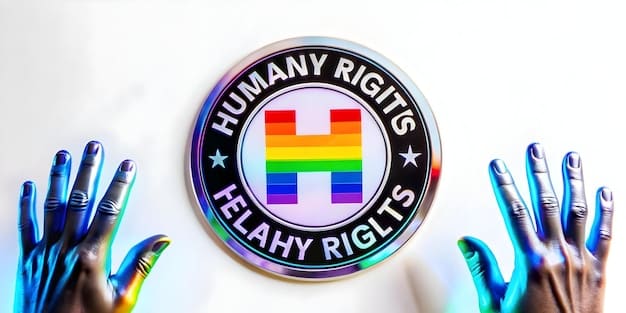
Key Organizations and Initiatives
Some key organizations include:
- The Human Rights Campaign (HRC): Advocates for LGBTQ+ equality through legislative action and public education.
- GLAAD: Works to promote LGBTQ+ representation in the media and combat anti-LGBTQ+ discrimination.
- The Trevor Project: Provides crisis intervention and suicide prevention services for LGBTQ+ youth.
These organizations offer a range of resources, including legal support, mental health services, and educational materials. By connecting with these resources, LGBTQ+ players and allies can empower themselves and advocate for change.
Connecting with available resources can help those impacted deal with the impact of anti-LGBT legislation on esports participation in the US: What players need to know, because these resources provide real-world support.
Staying Informed and Taking Action
Staying informed about anti-LGBT legislation and taking action are crucial for protecting LGBTQ+ rights in esports. The impact of anti-LGBT legislation on esports participation in the US: What players need to know is minimized when awareness leads to action.
This includes monitoring legislative developments, contacting elected officials, and supporting pro-LGBTQ+ candidates.
Ways to Get Involved
Here are some ways to get involved:
- Stay informed: Follow news and updates from LGBTQ+ advocacy organizations.
- Contact elected officials: Voice your concerns about anti-LGBT legislation to your representatives.
- Support pro-LGBTQ+ candidates: Donate to and volunteer for candidates who support LGBTQ+ equality.
- Participate in protests and rallies: Show your support for LGBTQ+ rights by joining demonstrations.
By staying informed and taking action, the esports community can play a vital role in shaping a more inclusive and equitable future for all.
Remaining constantly up to date on information will ensure the impact of anti-LGBT legislation on esports participation in the US: What players need to know is kept in the public consciousness and that steps remain in place to advance equality.
| Key Point | Brief Description |
|---|---|
| 🏳️🌈 Anti-LGBT Laws | Impact LGBTQ+ inclusion and participation in esports. |
| 🛡️ Player Safety | Ensuring safe environments at esports events is paramount. |
| 📣 Advocacy | Supporting organizations that fight for LGBTQ+ rights. |
| 🤝 Community | Esports community must unite to foster inclusivity. |
Frequently Asked Questions
Anti-LGBT legislation, particularly sports bans, can prevent transgender players from participating in esports events consistent with their gender identity. This can cause discrimination and limit opportunities.
Ensure safety, choose welcoming locations, implement safe codes of conduct, offer diversity training, and involve LGBTQ+ organizations. They can promote visibility and reinforce safe environments.
Mental health support is available through organizations like The Trevor Project, which provides crisis intervention and suicide prevention services for LGBTQ+ youth. There are other resources as well.
Allies can support by advocating inclusivity, challenging discriminatory behavior, amplifying LGBTQ+ voices, and donating to organizations that fight for LGBTQ+ rights. Alliances foster safe spaces.
Esports organizations should establish clear codes of conduct, provide diversity training, and support LGBTQ+ inclusive events. They also have a responsibility advocate for policy changes.
Conclusion
The impact of anti-LGBT legislation on esports participation in the US: What players need to know is significant and far-reaching, affecting players, events, and the overall esports community. Despite recent challenges, by staying informed, advocating for inclusivity, and supporting LGBTQ+ organizations, the esports community can create a more welcoming and equitable environment for all.
It is up to those who champion human rights and inclusivity to ensure that the esports community continues to grow and thrive, thereby setting an ideal in the face of hate.




